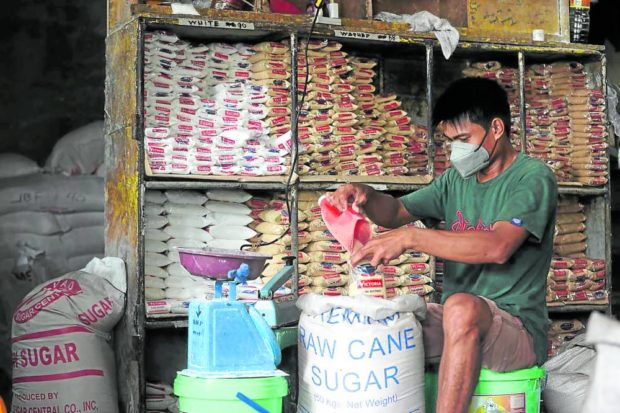
GETTING SMALLER | A store helper repacks washed sugar at Tandang Sora Public Market in Quezon City. (Photo by NIÑO JESUS ORBETA / Philippine Daily Inquirer)
MANILA, Philippines — Manila Rep. Bienvenido Abante Jr. has filed House Bill No. 5081, which proposes to abolish the Sugar Regulatory Administration (SRA) which, he said, has been ineffective in its mandate to boost local sugar production and has instead contributed to the industry’s decline.
Under the bill, Abante said regulatory functions of the SRA would then revert to the Department of Agriculture. The proposed measure has been referred to the House Committee on Agriculture and Food.
In his explanatory note, Abante pointed out that the SRA was created in 1986 as a body that would put in place a system in sugarcane production, maintain a balance between production, requirement, and marketing conditions, promote sugar merchandising and craft policies and plans for the industry.
‘Highly regulated’
“Sugar is a highly regulated industry. There are restrictions on the inter-island shipping of sugar, mandatory sharing arrangement between sugar mills and sugarcane planters ranging from 60 to 40 percent to 70 to 30 percent (planters’ and mills’ share, respectively), mandatory warehouse receipt or quedan system that segments the utilization of raw sugar into specific uses: exports to the United States; domestic market; reserve and world exports,” Abante noted.
He pointed out that the SRA had recently only allocated for US exports and the domestic market “with domestic production already falling short of domestic requirements.”
The lawmaker cited a report of the US Foreign Agricultural Service (US FAS), which forecast Philippine sugar production for 2023 to decline by 50,000 to 2 million metric tons due to high costs of fertilizer.
“Sugar production in the Philippines for [marketing year] 2022 is also below target because of the damage to sugar farms in December 2021 by Typhoon ‘Odette,’” he said, adding that the US FAS expects no sugar exports from the Philippines in 2023.
High prices
“This is why our country has been reeling from a sugar shortage in the past few months. Add to these the problems the incompetence and corruption that is prevalent in the SRA — the agency tasked to regulate the sugar industry,” Abante claimed.
The Manila representative cited high prices of raw and refined sugar sold to ordinary households and businesses, attributing soaring costs to a “problematic sugar industry” to which the SRA “has not helped find any solution.”
“While the shielded high domestic price of sugar has helped support the sugar industry, domestic sugarcane production has not achieved higher productivity nor has the industry as a whole become more competitive over time. On the other hand, it has increased the cost of sugar for consumers and for food and beverage manufacturers, in turn undermining the competitiveness of the latter,” he observed.
He concluded, “Thus, it would be better to abolish the agency now and transfer its powers, functions and budget to the Department of Agriculture.” The SRA has a proposed budget of P1 billion for next year, an increase from the P712.2 million in the 2022 general appropriations act.
RELATED STORIES
‘My conscience is clear’: Ex-SRA chief Serafica denies alleged kickback on sugar importation mess
Senate panel recommends charges vs DA, SRA execs for sugar importation mess
Rodriguez admits asking SRA to draft import order